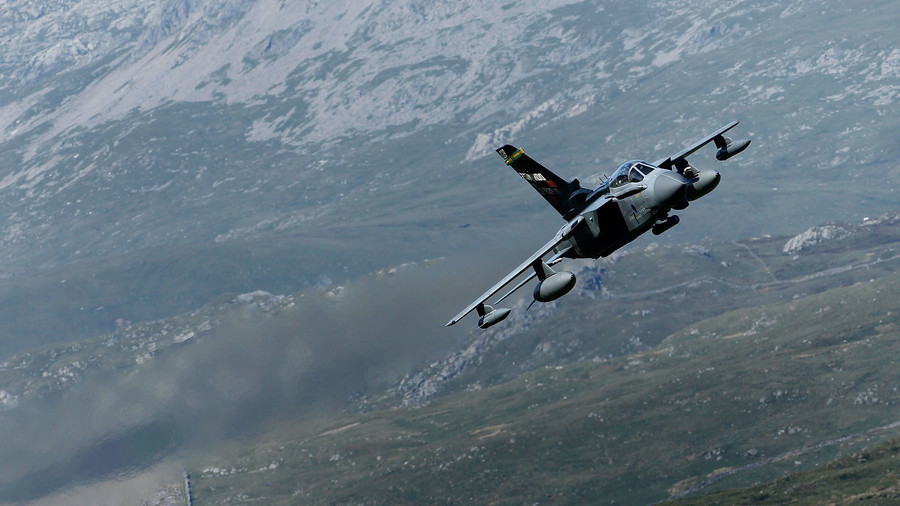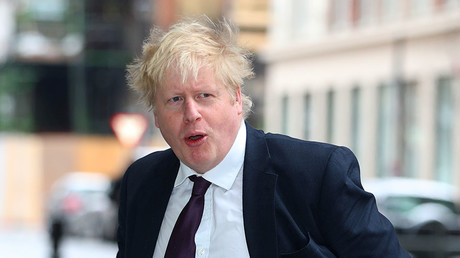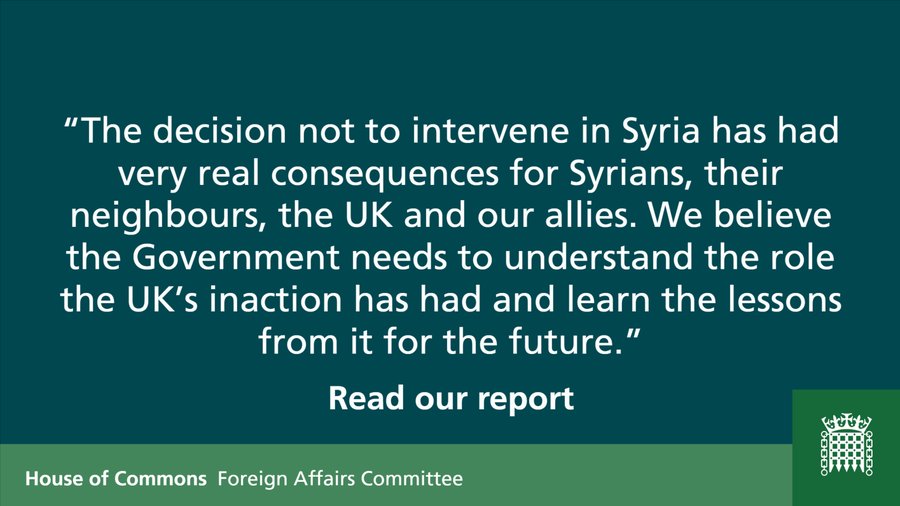Beyond Orwellian: Myth of UK's 'non-intervention' in Syria
Neil Clark is a journalist, writer, broadcaster and blogger. He has written for many newspapers and magazines in the UK and other countries including The Guardian, Morning Star, Daily and Sunday Express, Mail on Sunday, Daily Mail, Daily Telegraph, New Statesman, The Spectator, The Week, and The American Conservative. He is a regular pundit on RT and has also appeared on BBC TV and radio, Sky News, Press TV and the Voice of Russia. He is the co-founder of the Campaign For Public Ownership @PublicOwnership. His award winning blog can be found at www.neilclark66.blogspot.com. He tweets on politics and world affairs @NeilClark66

A new House of Commons Foreign Affairs Committee Report calls on the UK government to launch an inquiry into its 'non-intervention' in Syria. This is gaslighting on a massive scale, because there's been intervention aplenty.
What do you understand by the term 'non-intervention'? Not intervening in something, I presume? It's clear that the Foreign Affairs committee has another definition which is the complete opposite. In their 'Through the Looking Glass' world, 'non-intervention' actually means 'intervention'. Bombing the country in question, funding, supplying and training 'rebel' groups to attack government forces, imposing sanctions and doing everything possible to keep the conflict going, are all examples of 'inaction', it seems.
"The decision not to intervene in Syria has had very real consequences for Syrians, their neighbors, the UK and our allies," the report declares. Actually it was the decision to intervene which did that. Syria would be in a far better state if the UK and its regional allies had genuinely not meddled, illegally, in the internal affairs of a sovereign nation.
Let's recap Britain's role in the conflict. The former French Foreign Minister Roland Dumas claimed in an interview on French television that two years before the war began, UK officials had told him they were "preparing something" in Syria. "This was in Britain not in America. Britain was organizing an invasion of rebels into Syria," Dumas said.
If the idea of Britain conspiring to overthrow the Syrian government sounds far-fetched, then consider this. We already know that in 1956/7 there was a joint UK/US plan to do just that. It involved agent provocateurs being deployed to stage a number of incidents, which would then be used as a pretext for invasion and 'regime change'.
"Once a political decision is reached to proceed with internal disturbances in Syria, CIA is prepared, and SIS [MI6] will attempt, to mount minor sabotage and coup de main incidents within Syria, working through contacts with individuals."
"The two services should consult, as appropriate, to avoid overlapping or interfering with each other's activities," the plan said.
If Dumas is correct, something very similar was in the offing in 2009/2010 too. Perhaps the government just dusted down the old 1950s blueprint.
It didn't take Britain too long, when the violence started in Syria in 2011, to call for President Assad to step down. In fact 'Assad must go' became an obsession for the UK's political elite, a goal they seemed determined to pursue at any cost and irregardless of the fact that among the forces opposed to Assad were al-Qaeda affiliates and other extreme sectarian groups. In June 2012, an Israeli website suggested that British Special Forces were already operating inside Syria.
Two months later, Foreign Secretary William Hague announced that Britain was to give an 'extra' £5m (on top of £1.4m) to Syrian opposition groups, including radio and satellite equipment. Again, how can this be classed as 'non-intervention'?
Also that August, it was reported that the Syrian 'rebels' were receiving 'aid' from British intelligence. The Sunday Times quoted an opposition official who said that the British authorities "know about and approve 100%" intelligence from their Cyprus military bases, being passed through Turkey to the rebel troops of the Free Syrian Army (FSA)."
Writing in the Independent one year later, Kim Sengupta revealed that Britain had handed over equipment worth £8m to Syrian 'rebels', including "five 4x4 vehicles with ballistic protection; 20 sets of body armour; four trucks (three 25 tonne, one 20 tonne); six 4x4 SUVs; five non-armoured pick-ups; one recovery vehicle; four fork-lifts; three advanced "resilience kits" for region hubs, and VSATs (small satellite systems for data communications."
Throughout 2013, the UK was doing all it could to escalate the conflict by pushing other EU countries to agree to arming the Syrian 'rebels'. "It is difficult to imagine a more hopeless or stupid policy from our head of diplomacy", wrote Neil Hamilton, (that's the former Conservative MP and not the actor who played Commissioner Gordon in the 1960s Batman TV series), in a Sunday Express article entitled 'Hague on path to Syrian hell'.
Things came to a head in August 2013, as Prime Minister David Cameron asked for Parliamentary support to bomb Syria. It was clear by then, that air strikes, at the very least, were needed if Assad was to be ousted. The war lobby were confident of a 'Yes' vote but Labour, led by Ed Miliband, voted against. Miliband correctly said that the House of Commons (for once) had spoken "for the people of Britain."
It was this decision which is always cited as a 'great mistake' by the Syria hawks but they ignore what went off before, and after it. The UK government had been thwarted but they continued to push for 'regime change'. Cameron finally got Parliamentary approval to bomb Syria in December 2015, (this time on the basis of fighting Islamic State (IS, formerly ISIS/ISIL) which had gained ground in Syria largely because of the policies of the US/UK and their allies), but the BBC reported in July 2015 that air strikes on the country carried out by British pilots had already taken place. News of this only emerged after a Freedom of Information Request.
Between December 2015 and June 2016 there were a total of 51British air strikes in Syria. This year, there has been further bombing, including the targeting of military bases near Damascus and Homs in April.
"We believe that the consequences of inaction can be every bit as serious as intervening," the Foreign Affairs committee report states.
How can we explain this extraordinary attempt to portray Britain's extensive and well-documented operations in Syria as 'not intervening'? After all so much is on the public record, including, on the Ministry of Defence website, details of RAF air strikes.
A look at the membership of the Foreign Affairs Committee is illuminating. Its chair, Tom Tugendhat, Tory MP for Tonbridge and Malling, is a hardcore neocon and a former member of the Intelligence Corps. Peter Oborne, the highly respected political commentator, wrote about the 'neocon coup' that took place on the committee last year and warned us of its consequences. But how many were paying attention?
Other members of Tugendhat's committee include Ian Austin, the Labour MP who likened Russia's holding of the World Cup to Nazi Germany's hosting of the 1936 Olympic Games, and who told Jeremy Corbyn to "sit down and shut up"when he was criticizing the Iraq war.
Then we have Chris Bryant, a signatory to the statement of principles of the uber neocon Henry Jackson Society and Priti Patel, who stepped down from the Cabinet in 2017 when it was revealed she had undisclosed, unofficial meetings with Israeli ministers. In fact, if we look at the composition of the committee and compare it to the far more balanced one under the chairmanship of Crispin Blunt, (which produced a critical report on the UK government's intervention in Libya in 2016) it's no surprise we've got the document we have.
Neocons know that after the disasters of Iraq and Libya, 'interventionist' foreign policies have been utterly discredited. So, the only way out is to portray Syria, however ludicrously, as an example of UK 'non-intervention', in the hope that some people might fall for it and support 'rectifying' the 'inaction' at some point in the near future. Perhaps in response to a non-independently verified chemical weapons attack in Idlib, later this month? The Foreign Affairs Committee report, which makes George Orwell's 1984 look quite understated, is perfectly timed for that.
Follow Neil Clark @NeilClark66
The statements, views and opinions expressed in this column are solely those of the author and do not necessarily represent those of RT.




0 Comments:
Post a Comment
Subscribe to Post Comments [Atom]
<< Home